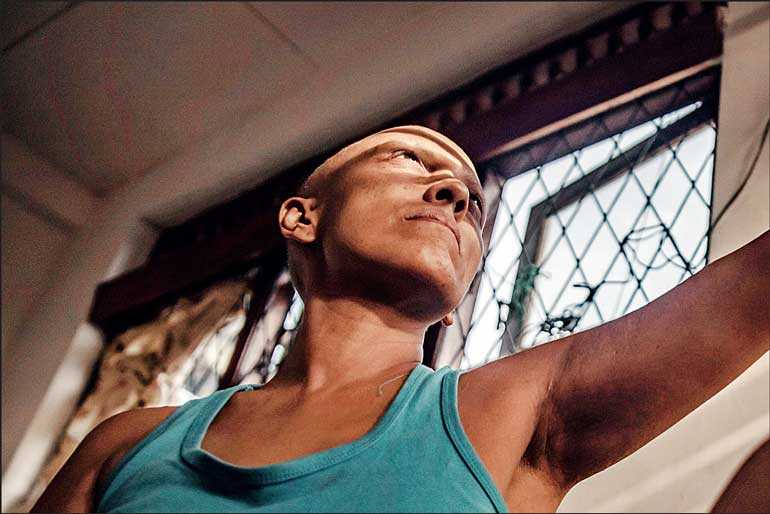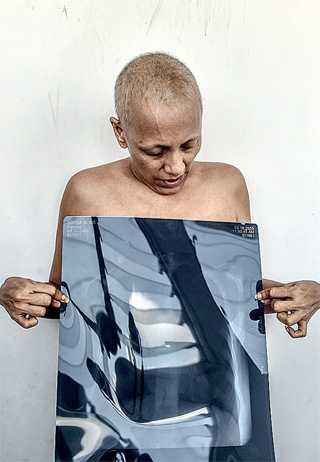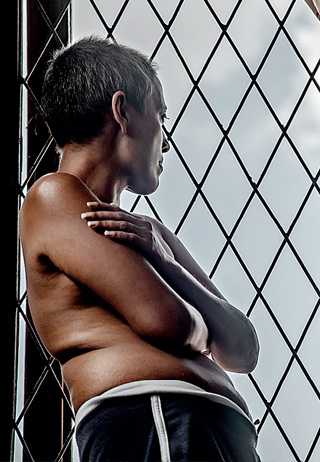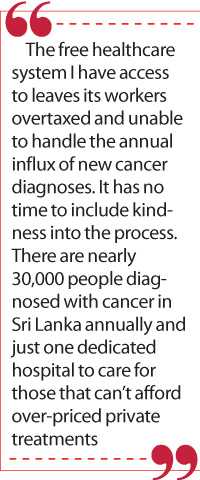Tuesday Feb 24, 2026
Tuesday Feb 24, 2026
Friday, 22 January 2021 00:07 - - {{hitsCtrl.values.hits}}

“The logic of needing to hide that I had breast cancer and that I would lose my breasts confounded me. Why is there shame in being diagnosed with cancer at all?”

In June, Natalie underwent endless tests and started an eight-cycle chemotherapy regimen and in October, lost both breasts, some muscle and several lymph nodes

“The fact that healthcare is overwhelmed with gendered politics is unfair. Not only do I have to battle cancer, but archaic social attitudes related to gender”

“There is frankly only so much of an assault I can take to my body and state of mind and I feel like I’m nearing that limit now”
Natalie was diagnosed with metastatic breast cancer in May 2020, in the background of the pandemic. Even as the world changed for just about everyone, Natalie’s world was completely upended. In June, Natalie underwent endless tests and started an eight-cycle chemotherapy regimen and in October, lost both breasts, some muscle and several lymph nodes. In December it was time for a 15-day cycle of radiation. Ever the warrior and nonconformist, Natalie has come out fighting, raging, vocal, and willing to share her experience in a society that treats cancer like a dirty secret and speaks extensively about the public healthcare system. Following are excerpts of an interview:
By Marianne David
|
Natalie was diagnosed with metastatic breast cancer in May 2020 |
Q: Last year you were diagnosed with metastatic breast cancer and you’ve spent the last nine months fighting, accepting, transforming. Even as we speak in this new year, you are in and out of hospital for in-patient treatment. Where do things stand right now?
What I’ve realised is that our public healthcare system is overloaded and as a result a regular scanning process isn’t built into the way things happen. I haven’t been asked for a CT scan since my diagnosis in May so I technically don’t know where I stand.
When I was diagnosed in May, I went through a battery of tests that included a CT scan, a mammogram, several scans and an ultrasound guided nodal biopsy. This resulted in me starting six
cycles of two different chemotherapy drugs1 followed by a surgery to remove my breasts, some muscle and several lymph nodes which were all sent to the lab to be tested.
Based on the results, my oncologist decided that I needed 15 daily cycles of Gamma Radiation. Once I went and booked my sessions, the doctors changed their minds and opted to put me on a new regimen of a third type of chemotherapy drug (Paclitaxel) which needs to be administered as in-patient as it has been known to cause anaphylactic shock in some patients. I have undergone one of these treatments so far which caused an unimaginable amount of pain for several days and didn’t respond to any pain medication.
I go in for another cycle next Friday. I have decided to give myself a CT scan thereafter as I would like to know where I stand if this much treatment is really necessary. There is frankly only so much of an assault I can take to my body and state of mind and I feel like I’m nearing that limit now.
Q: Could you tell us your experience with public healthcare from the moment you knew about the cancer?
I consult my doctors privately as there is little time available in the clinics at the Apeksha Hospital when a handful of doctors need to see nearly a thousand patients each day. So compiling my treatment plan took a day with my lead oncologist. When I went to Apeksha, it was to start my first chemo treatment.
The experience wasn’t pleasant, to say the least. Having to undergo treatments during a pandemic has meant being jam-packed with hundreds of patients in the clinic waiting rooms where at least one person tests positive for COVID-19 daily. It has meant risking my life to battle cancer and frankly no one seems to care. I posted some images of the sardine-packed clinics on my social media, requesting from the President, PM, Health Minister and Director of the National Cancer Institute to please help by at least setting up a PA system so that patients didn’t need to crowd around clinic doors to hear their names being called to see the doctors. The result was that the Hospital Director posted notices around the hospital naming and shaming me for saying what I said and calling on the gods to curse and punish me. I am appalled that this kind of language was used by a State healthcare official when all I was asking for was a safe environment as a patient with no immune system2.
The free healthcare system I have access to3 leaves its workers overtaxed and unable to handle the annual influx of new cancer diagnoses. It has no time to include kindness into the process. There are nearly 30,000 people diagnosed with cancer in Sri Lanka annually and just one dedicated hospital to care for those that can’t afford over-priced private treatments. In 2018, South Asia recorded over two million new cancer diagnoses. These numbers are growing alarmingly and annually – and the overall number of people living with (and dying of) cancer are at an alarming high. Most who go through public healthcare are taught to never question the process and let doctors do as they deem fit. No doctor wants a patient to die, but that doesn’t mean they all have the time to consider the entire breadth of your needs or your mental health while trying to cure your body.
As a former British colony, Sri Lanka’s indigenous medicine was overtaken and a Western practice established just over a century ago. Traditional medication was replaced by capsules and syrups that seemed to magically remove many ailments, giving the post-colonial ‘doctor’ an almost godlike status. As a result, doctor’s decisions are rarely questioned and malpractice suits unheard of. We also tend to dismiss treatments that don’t involve an oncological approach into a broad subcategory titled ‘alternative medicine’, automatically removing their legitimacy as a valid form of treatment. This not only creates issues of access to treatment, but creates an overarching sense of disregard. This limits research, funding and public access to information on these ‘alternatives’ to the colonially established healthcare norm. There also seems to be a sense of hypocrisy on the part of the Sri Lankan Government that opts to grow and export medical marijuana to those overseas, while the plant remains illegal in the country.
Q: You couldn’t be more accurate when you say that cancer is very much a private illness in Sri Lanka. What kind of an impact did that reigning silence have on you, what made you choose to speak out, how has your approach been received, and how has it helped?
I think this sense of ‘privacy’ intensifies when it comes to women’s cancer that relate to their breasts or reproductive system. The logic of needing to hide that I had breast cancer and that I would lose my breasts confounded me. Why is there shame in being diagnosed with cancer at all? I think these ideas are deeply rooted in our gender biases that make women feel their status as women would be diminished by losing a body part that is unnecessary attached to our gender identities.
In fact, when I was hospitalised for my mastectomy surgery, I found my conversations with many others in the ward perplexing. While my diagnosis only required removing my right breast, I requested a bilateral mastectomy to try and prevent a recurrence of cancer. It seemed I was the only one who made this request. Other mastectomy in-patients were shocked. “Why would you do that?” they asked, “You’ll look like a boy”. There seems to be some unspoken rule that having one breast would preserve our sense of gender.
The fact that healthcare is overwhelmed with gendered politics is unfair. Not only do I have to battle cancer, but archaic social attitudes related to gender.
Q: You said the chemotherapy regimen left you questioning your sanity as much as your gender, but due to the all-pervading silence, no one really speaks about the chemo experience. Could you tell us about what it was like for you?
Let me describe my most recent chemotherapy experience while it is fresh on my mind. I was in hospital for two days, being pumped with IV steroids every six hours to help prevent an immediate reaction for 24 hours before the chemo was administered.
Two days after I came home, all hell broke loose but no painkillers were prescribed to help circumvent what would happen. I felt like I was being beaten up with a heavy object in a different part of my body every few seconds. First my head, then my ankles, my crotch, my spine, my knees, my surgical scars, my stomach and then it would repeat all over again. You can imagine what this can do to someone’s state of mind when it continues for days.
I’ve had to privately get prescriptions for pain medication and sleeping pills to help me ride this out and to be honest, this didn’t help much either. I couldn’t sleep for more than a couple of hours at a time, as I kept waking up in pain and to retch. I was very, very close to having a complete mental breakdown.
Q: Speaking about your experience with the healthcare system, you said little care was given to your emotional wellbeing and the system prioritises preserving the physical, which found you mourning the loss of yourself. Could you expand on this?
Gendered politics aside, losing any part of your body isn’t easy. I was a surgical patient in the hospital for eight days. During this time, I was bullied and laughed at several ward nurses and this would continue from shift to shift. I noticed that every patient gets bullied at the point they enter the ward as if it’s a form of initiation to let patients know who is in charge.
You are expected to know what clothes you are permitted to wear as an in-patient but this information is only given to you once you enter the ward. If the right list of things aren’t in your bag, you are asked to sit outside until a relative brings them for you. Of course this behaviour changes drastically when a doctor enters the ward and the nurses become more attentive. During the night shift, nurses move into a separate room to doze off and no patients are looked into in the nights between 10 pm and 4 am.
On the day my surgical dressings were changed three days post-op, I had a panic attack. It was the first time I had seen my body like that, stapled up and missing a part of me that I had become accustomed to. The nurses ripped the bandages off and I screamed in both pain and shock. When I asked if they could give me something to calm down or ease the pain, one smiled saccharinely and said “this is not a private hospital” and continued to roughly clean up the surgical wounds.
I also had two surgical drains stitched and attached to both sides of my body to drain any excess fluid that could build up in my chest. The left drain was ready to come out while I was in hospital because the fluid output was low. When my surgeon requested it be removed, the nurse took me into a small procedure room and ripped it out of me with the stitches still intact. My most recent scan indicated that the hole is still not healed due to this ripping out. The right drain which was taken out at a private hospital days later, happened differently and with no pain because the stitches were cut before it was removed and has since healed.
When it was time to leave the hospital, the senior surgical resident signed me out and asked that the right drain not be removed as the fluid output was high. Once he left, the junior medical officer came in and insisted the drain be removed as it was ‘ward policy’. When I asked her about the possibility of a fluid build-up in my chest (a dangerous condition called a seroma), she laughed at me and asked me why I felt I was special. When I refused to have the drain removed, she demanded that I stay for as long as she deemed fit. As if it was a punishment. I decided to laugh back at her and remind her that a hospital was not a prison and signed myself out against her medical advice. I have since found out that this same MO’s negligence had killed a patient a few days later.
Q: You visually documented your journey with cancer via your photography. Why did you do it and how did it help?
I started documenting it for my son, so he would know how bravely I fought to survive for him. As time went by, I also realised this so-called ‘private’ illness had zero personal narratives coming out of South Asia. As a result the massive evolution a breast cancer patient must go through in this part of the world must happen in isolation. There is no handbook, there is nothing out there to someone with breast cancer or any form of cancer know that they are not alone. So this narrative now is for all women; women with cancer, women who have lost their breasts, women putting off their breast exams and pap smears.
Q: The mastectomy changed your perception of the female body. In the context of how women and their bodies are viewed in Sri Lanka, what are the conversations we need to have, what needs to change?
For one, talking about breast cancer has to stop being a pink-ribbon-October-centric narrative. And when we do talk about breast cancer, we need to have more narratives like mine available in the public sphere that will spark off necessary dialogues around what actually constitutes identity and what doesn’t. This will, at least in some way begin to remove the stigma around the loss of breasts.
Q: Your bilateral mastectomy triggered more questions around your identity and you are no longer comfortable with being called a woman and found your identity morphing. How do you identify now and what it is like – this new body, this new you?
I don’t think I am in any sense a new me. Instead, I am more of myself than I ever was because I have learned to be fearless and brave in the face of ridiculously nonsensical gender politics. I no longer let anyone else’s sense of identity or gender shape who I am. I have always been different and never quite associated with any of the language in our current lexicon when it comes to describing gender. What cancer and the resultant loss of breasts, muscle and oestrogen have taught me is that none of it affects who I am.
Q: What drives you? How are you so resilient?
My endless rage against the machines of systemic power. The way the world is so gendered that we don’t even realise we’re following archaic norms until it’s too late. That one gender thinks they have the power to limit a woman’s mobility, expression and go to the extent of raping them within a system that takes over a decade to hear these cases. The way one community, be it based on race, gender, religion or sexual orientation, can be given a sense of imagined power over the other which in turn creates real problems, especially for Sri Lanka. I will keep fighting the good fight for as long as I am alive.
Footnotes
1 One was Doxorubicin, the strongest chemo drug available today and referred to as the ‘Red Devil’ because of its red colour and the hellish side effects it causes. The second was Cyclophosphamide which is a mustard gas derivate, originally used as a torture gas during World War 1.
2 I have photos of the notices posted in the hospital and can provide them if needed.
3 I think it’s necessary to realise free healthcare is in fact a public-funded system which implies that I have actually already paid for my treatments by way of taxes imposed on my income as well as every product and service I have paid for in over 20 years.